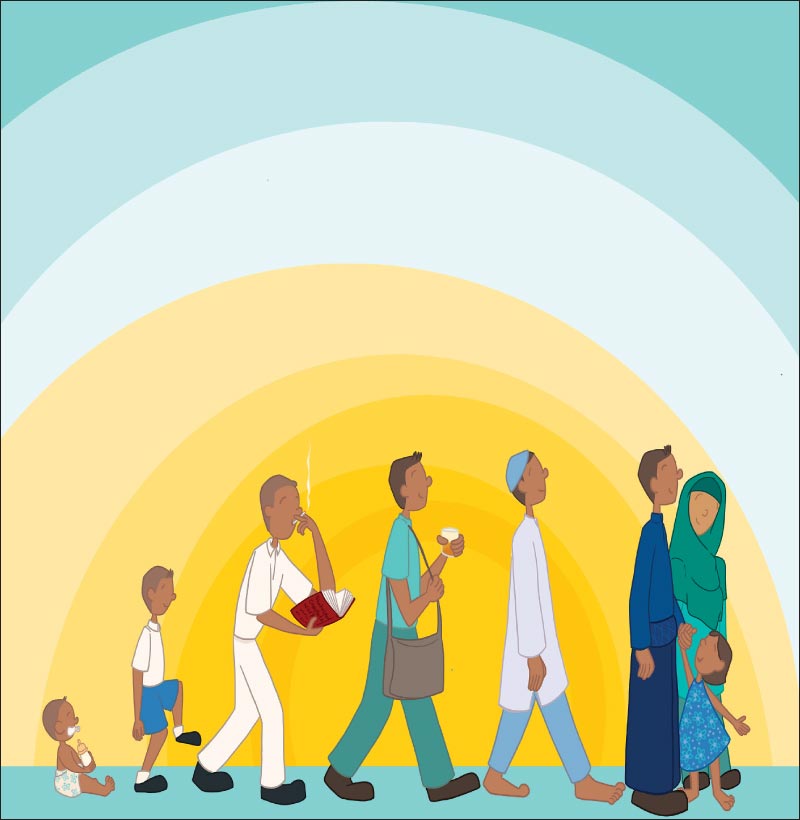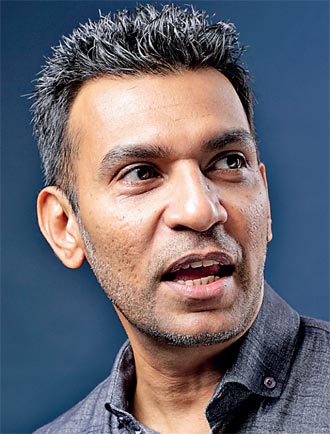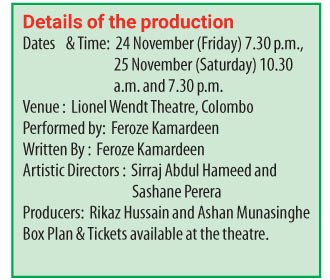Saturday Feb 21, 2026
Saturday Feb 21, 2026
Thursday, 23 November 2023 00:00 - - {{hitsCtrl.values.hits}}

|
By Nisthar Cassim
 |
| Feroze Kamardeen |
 |
Renowned and controversial playwright and director Feroze Kamardeen this weekend will come to terms with his biggest ever personal challenge in nearly three decades in theatre.
The occasion is “Grow Up Nana,” his latest satirical play to be staged at the Lionel Wendt on Friday and Saturday.
Self admittedly the biggest challenge is because of the subject matter, a look at Sri Lanka Muslims by a Muslim, a one-man play, the script for which was written by Feroze and will be played by him. This makes Grow Up Nana a show of many firsts in Feroze’s career as a scriptwriter and director since 1996.
Feroze has directed nearly 30 plays and written an equal number. He rose to fame with the political satire "Puswedilla" or "Thank you for voting" in 2007. Its success was such that by 2014 Feroze had directed five parts. Among 29 plays that he has directed include the Freddy series and Arsikland the Musical.
The upcoming “Grow Up Nana” according to Feroze also reflects a bit about him, his personal experiences. “Nana” (meaning elder brother) is Feroze’s nickname among his non-Muslim friends and he has been quite comfortable to be called so though he says some Muslims tend to get offended by the phrase “Nana” or “Thambi” (younger brother).
The play among other things deals with affairs of the Muslim community including funerals and weddings which he says are structured and rigid though there are positives and negatives from the perspective of the contemporary society.
“We Muslims don’t have many options when it comes to funerals and weddings,” opines Feroze, who with his one-man act tries to find some humour and in the process also explain to people of other faiths why Muslims do such things. The play also deals with issues faced by Muslim girls and women.
Call to the Muslims
“Grow Up Nana” also appears to be Feroze’s call to the Muslims who, according to Feroze, have been guilty of being insular as a community in the past 30 years or so. “Prior to that Muslims had integrated with the rest of the society a lot better so I feel Muslims overall need to be more inclusive and reach out more to the other communities,” says Feroze adding that, by doing so Muslims must take charge of their own narrative. “Grow Up Nana” in that sense is likely to send a strong message to the Muslims primarily and also help others understand the community better. “People are a little bit on edge when it comes to the Muslim community,” opines Feroze.
However, Feroze confesses “I don't see it as my job to essentially propose solutions for everyone. But via the play I am raising some pertinent questions for everyone to reflect within. Most of these changes are actually in the hands of older men (Nanas) in our society.”
When posed the question whether it is correct to generalise based on some practices or attitudes of Colombo’s Muslim society, Feroze says those are widespread in society as the play deals with different segments of the broader Muslim community including the Moors, Bohras, Memons and Eastern province Muslims.
“I have a thing on us and how we perceive each other. We have been subject to racism and all that. We Muslims also do it very adorably among each other too. We look at Moors differently, at Memons differently, at Bohras very differently and at Eastern people differently. We also have those little hierarchies that we put for ourselves,” points out Feroze.
“There are many things not dictated by religion, yet Muslims insist on continuing with them. So, I am trying to break through some of those stereotypes and myths. I am trying to create a fun environment where people can feel comfortable because I do say at some point you have the opportunity to laugh with and at us,” says Feroze.
Indeed, via his pre-show marketing Feroze warns would-be audiences that “Grow Up Nana” is going to get personal, very personal” as well as a mischievous message, “Laugh with them and at them? Who’s them?”
However, he credits Muslims in Sri Lanka to be very tolerant and they enjoy a good joke, a comfort with which Ferzoe wrote the script though in Islam there is little space for the role of comedian, plays or theatre. “I think it's a form of expression. It can be a very direct form of expression. It's actually quite cathartic to be very honest. I also see women wearing hijab doing stand-up comedy,” he added.
|
A show for all communities
Feroze reiterates “Grow Up Nana” isn’t an attempt to shape or influence change for the better but to start a conversation and reflect within since as a Muslim himself he has the gravitas to talk about it.
Essentially, “Grow Up Nana” is a personal story of Feroze, first as a playwright, second as a member of the Sri Lankan Muslim community, and third in a larger sense, as a Sri Lankan citizen.
In that context, Feroze says “Grow Up Nana” will be entertaining and enlightening to all communities and faiths as it has ample examples of commonality. “The non-Muslims in the audience will be pleasantly surprised to discover some of the things I say about how we (Muslims) perceive them, how we understand them,” quips Feroze.
Though billed to be filled with humour, “Grow Up Nana” also has some serious messaging including some of the injustices encountered by the Muslim community in the recent past. Feroze says, for example when the play deals with Muslim funerals, it also talks of the trauma the community went through with forced cremation during the COVID-19 pandemic and explains why immediate burial is required when death occurs in the Muslim community. The play also touches on the Muslim community’s perception of the Aragayala, and politics, apart from the realities of life.
|
 Personal challenge
Personal challenge
Individually for Feroze, “Grow Up Nana” is a personal test too. It will be his first performance on stage in 16 years with the last one being “Oleanna” in 2007. Since then he had focused only on direction and scripts.
“Grow Up Nana” is the most challenging as I haven’t done the dual role of scriptwriter and acting solo. It is also very personal, because everything in the script is drawn from my own personal experiences. Nothing I wrote ever came to this. Everything I wrote was for other people. But this piece is different. This is about my community, my life, my experiences. Here, it's just me, there's no filter for somebody else. It's me doing. So it's been very challenging, it's so personal to me. Everything that I have written has a background story to it. It almost feels like this is one of my bucket lists,” reveals Feroze with some nostalgia listing a few real life personal incidents during this interview.
Feroze also believes that no one else can perform the “Nana” character realistically, than him. However, he gives credit to Sirraj Abdul Hameed and Sashane Perera, the Artistic Directors of the play and Rikaz Hussain and Ashan Munasinghe, the producers.
Though Feroze sounded like “Grow Up Nana” could be his last hurrah, all those who will watch him on stage this Friday and Saturday, are sure to truly discover the man, who enthralled millions by his works for others and about others, via his own story yet untold.